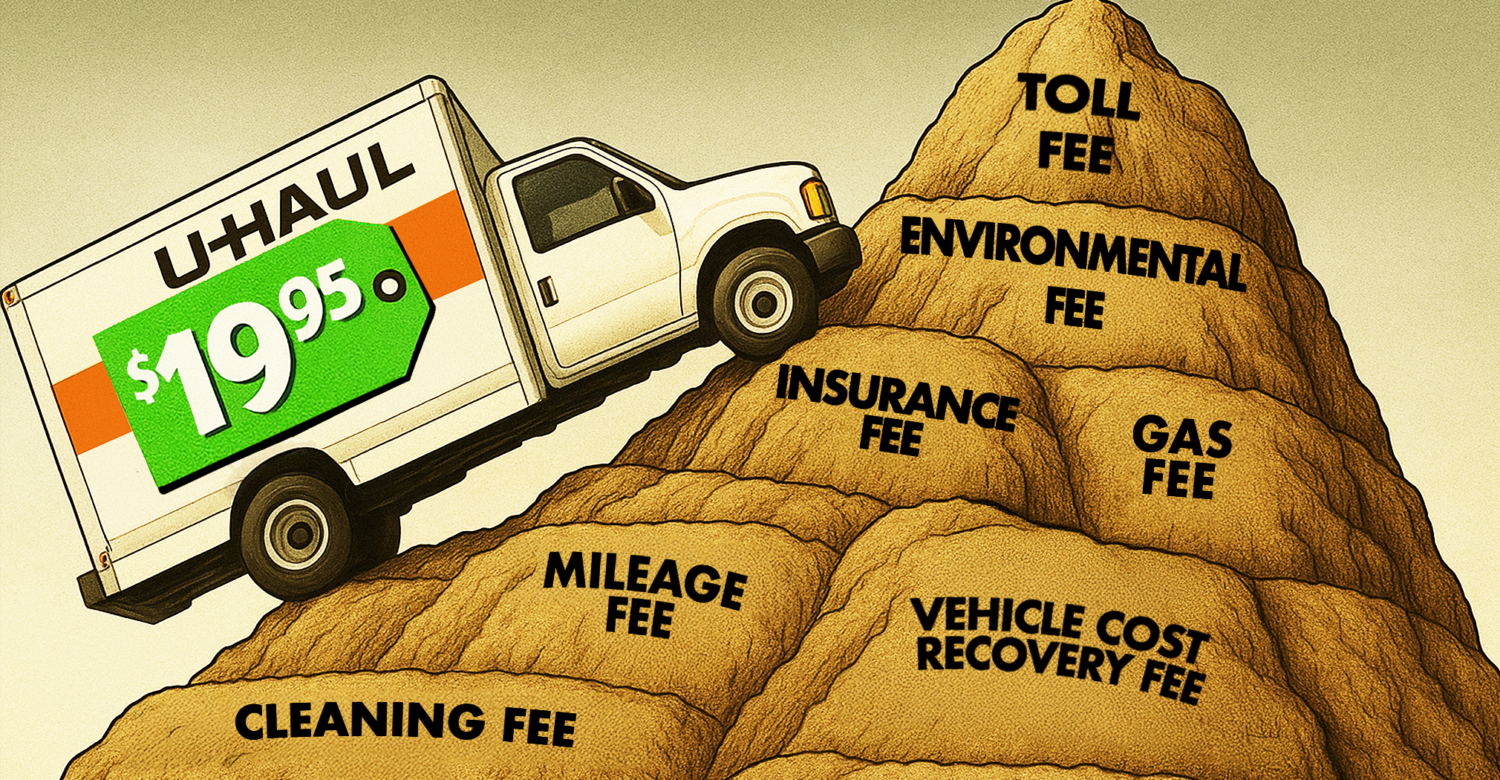
U-Haul Taking a Bite Out of the Big Apple
TINA.org files complaint with NYC over company’s “$19.95” truck rentals.
TINA.org calls on regulators to stop moving company’s bait and switch.
Moving can be a stressful time. For some people, changing ones’ home address can be more stressful than starting a new job, having kids or getting divorced. Putting down new roots can also be expensive. And if you’re renting a U-Haul truck to move, it may be more expensive than you anticipated, according to a TINA.org investigation.
That’s because despite advertising for years that the cost to rent its trucks is $19.95, no one pays that amount.
After luring in consumers with the low rental price, TINA.org’s investigation found, U-Haul tacks on a multitude of mandatory fees and other charges throughout the rental process that the company never discloses in its advertisements. And these hidden fees can add up, easily turning a “$19.95 rental” into one costing three times or more that amount.
On Monday, TINA.org filed a complaint with the FTC, as well as 20 states and the District of Columbia, urging regulators to take enforcement action to stop U-Haul’s bait-and-switch pricing scheme.
TINA.org’s complaint notes that U-Haul has been advertising that its trucks can be rented for the low price of $19.95 for more than two decades. But the issue isn’t with the ultimate higher price U-Haul chooses to charge consumers, but rather with the company’s methodology.
[U-Haul] must be honest with consumers from the start as truthful, timely and transparent pricing, including the nature, purpose and amount of any fees or charges imposed, is critical for consumers to make informed purchasing decisions.
Among U-Haul’s target consumers are students moving to college, seniors who are downsizing and military members transferring to new locations.
Here’s what you should know about TINA.org’s investigation and complaint, which comes at the start of peak moving season observed during May as National Moving Month.
With more than 180,000 rental trucks on the road today, perhaps you’ve seen the $19.95 price advertised on the side of one of U-Haul’s vehicles (the price has also appeared on its vans). What you may not have noticed, unless you stopped in the middle of traffic to take a closer look, is the fine print on the truck stating that the low price is a special “In-Town” rate and excludes “mileage/fees.”
According to U-Haul, an in-town move is one in which the rental is dropped off at the same U-Haul location where it was picked up. So right off the bat, if you want to return the truck to a different U-Haul location (what U-Haul refers to as a “One-Way” move), you don’t qualify for the $19.95 offer.
But even for in-town moves, this advertised price is completely unattainable because it doesn’t account for a number of mandatory fees, which consumers don’t encounter until late in the U-Haul reservation process.
For starters, U-Haul charges everyone who rents a truck from the company an environmental fee and a vehicle cost recovery fee, which together can increase the cost of a 10-foot truck rental by $2 to more than $10. These mandatory fees are automatically added to a consumer’s shopping cart as part of the “equipment rental,” despite the fees providing no additional value to the consumer.
Consumers can click on the environmental fee in their shopping cart to learn that it is purportedly “used to support and foster the development and maintenance of sustainable U-Haul business operations.” But it’s worth noting that U-Haul’s explanation for why it charges the fee, which is generally $1 for in-town moves and $5 for one-way rentals, has changed over time, and the current fee description does not contain as many environmental benefit claims as it once did.
There is no link in consumers’ shopping cart to find out why U-Haul charges a vehicle cost recovery fee, which generally ranges between $1 and just over $5. However, an explanation of the fee is included in the rental contracts U-Haul provides consumers after a rental is reserved and paid for. They state that the vehicle cost recovery fee represents:
…the estimated average per day cost incurred by [U-Haul] to license, title, register, obtain number plates, and inspect its U-Haul Vehicles, and to pay any taxes owed on such U-Haul Vehicles.
Then there are additional costs for things like insurance because, as U-Haul informs consumers for the first time during checkout, while personal auto insurance policies often cover rental cars, “most auto insurance policies” don’t cover damages to rental trucks. U-Haul offers insurance coverage through a plan called Safemove, which starts at $15. The alternative is to “immediately reimburse” U-Haul tens of thousands of dollars in the event the rental comes back damaged. Safemove is the preselected option.
In addition, consumers must pay for mileage. According to U-Haul, the average mileage fee for in-town moves is between 59 cents and 99 cents per mile. However, TINA.org found that the mileage fee is often higher than 99 cents per mile and can exceed $2 per mile. TINA.org wrote in its complaint letter:
This means that for an in-town move in the Bronx, NY, for example (where the mileage is $1.99/mile for a 10’ truck), with just 10 miles of driving, the cost for a U-Haul truck rental, before any mandatory fees or optional costs are added, is already double the illusory advertised price of $19.95.
On a page explaining how to estimate mileage fees, U-Haul acknowledges that “there’s more to the price of a rental truck than just size and distance,” which, for the reasons outlined above, is a gross understatement.
On top of all this, there are “administrative” fees for tolls and tickets (in addition to what the tolls and tickets actually cost), and consumers have complained about still more fees they incurred unexpectedly, including extra mileage fees (or fees for exceeding the allowed mileage), cleaning fees, gas fees, lost key fees and late fees, just to name a few.
Not only has U-Haul advertised the same truck rental price for over two decades (raising the question, Is U-Haul impervious to inflation?), but it’s also come under fire for deceptive pricing in the past.
In 2010, the FTC filed an enforcement action against the company for inviting its competitor, Avis Budget Group, Inc., to join with U-Haul in a collusive scheme to raise and fix rates for one-way truck rentals. Unfortunately, as TINA.org notes in its complaint, this enforcement action, which resulted in a no-fault, no-money consent order, has done nothing to stop the company from continuing to engage in deceptive pricing tactics that significantly harm consumers and honest competitors alike.
Numerous consumers have reported experiencing significant financial hardship as a result of U-Haul’s drip pricing scheme. A sampling of complaints follows:
In short, U-Haul baits consumers with a low rental price and then after they’ve sunk their time and effort into trying to obtain the advertised rental, switches the offer so that consumers end up paying more. It’s a classic bait and switch.
And it’s time regulators put a stop to the deception.
U-Haul did not respond to TINA.org’s request for comment on its complaint.
Find more of our coverage on U-Haul.
TINA.org files complaint with NYC over company’s “$19.95” truck rentals.
MADISON, CONN. Sept. 9, 2025 – An investigation by consumer advocacy organization truthinadvertising.org (TINA.org) has found that Homeaglow is deceptively advertising $19 home cleanings in order to lure consumers into…
TINA.org files complaint against home cleaning platform with FTC, states.

